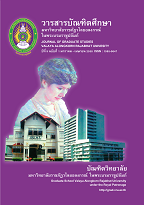ยุทธศาสตร์การพัฒนาตำรวจตระเวนชายแดน เพื่อความมั่นคงตามแนวชายแดนไทย
Main Article Content
บทคัดย่อ
การวิจัยครั้งนี้มีวัตถุประสงค์ (1) เพื่อศึกษาปัจจัยภายในที่มีผลกระทบต่อการพัฒนาตำรวจตระเวนชายแดน เพื่อความมั่นคงตามแนวชายแดนไทย (2) เพื่อศึกษาปัจจัยภายนอกที่มีผลกระทบต่อการพัฒนาตำรวจตระเวนชายแดน เพื่อความมั่นคงตามแนวชายแดนไทย และ(3) เพื่อนำเสนอยุทธศาสตร์การพัฒนาตำรวจตระเวนชายแดน เพื่อความมั่นคงตามแนวชายแดนไทย โดยใช้การวิจัยเชิงคุณภาพ รวบรวมข้อมูลทุติยภูมิจากเอกสารที่เกี่ยวข้อง และข้อมูลปฐมภูมิจากการสัมภาษณ์เชิงลึก ผู้ให้ข้อมูลสำคัญจำนวน 28 คน ที่เลือกแบบเจาะจง จากผู้ดำรงตำแหน่งระดับสูงคือ ผู้บัญชาการตำรวจตระเวนชายแดน รองผู้บัญชาการตำรวจตระเวนชายแดน ผู้บังคับการตำรวจตระเวนชายแดนภาค 2 รวมถึงข้าราชการตำรวจสังกัดกองบังคับการตระเวนชายแดนภาค 2 นักวิชาการ ผู้เชี่ยวชาญทางด้านรัฐประศาสนศาสตร์และรัฐศาสตร์ โดยใช้แบบสัมภาษณ์แบบกึ่งมีโครงสร้าง และดำเนินการสนทนากลุ่มจำนวน 12 คน ที่เลือกมาจากผู้บังคับบัญชาระดับนโยบายและ ผู้ปฏิบัติการในพื้นที่ ในสังกัดกองบังคับการตำรวจตระเวนชายแดนภาค 2 ทำการวิเคราะห์ข้อมูลโดยการวิเคราะห์เชิงเนื้อหา
ผลการวิจัย พบว่า
1 ปัจจัยภายในที่มีผลกระทบต่อการพัฒนาตำรวจตระเวนชายแดน เพื่อความมั่นคงตามแนวชายแดนไทย ประกอบด้วย การจัดโครงสร้างที่เหมาะสม ภารกิจที่ถูกต้อง การสร้างศักยภาพที่เข้มแข็ง และการสร้างขวัญและแรงจูงใจของตำรวจตระเวนชายแดน
2 ปัจจัยภายนอกที่มีผลกระทบต่อการพัฒนาตำรวจตระเวนชายแดน เพื่อความมั่นคงตามแนวชายแดนไทย ประกอบด้วย การจัดหน่วยให้เหมาะสมกับสภาพเศรษฐกิจ สภาพสังคมและสภาพการเมืองของประเทศ และพัฒนานโยบายที่เกี่ยวข้องกับตำรวจตระเวนชายแดนให้มีประสิทธิภาพรวมทั้งการสร้างสภาพความมั่นคงตามแนวชายแดนให้ยั่งยืน
3. ยุทธศาสตร์การพัฒนาตำรวจตระเวนชายแดน เพื่อความมั่นคงตามแนวชายแดนไทยมี 4 ด้าน ดังต่อไปนี้
3.1 ด้านการปรับโครงสร้างองค์กรเพื่อให้ทันต่อสภาพการณ์ทั้งทางเศรษฐกิจ สังคม และการเมืองในปัจจุบัน และมีความชัดเจนในการปฏิบัติงานด้านความมั่นคงตามแนวชายแดนประกอบด้วย การปรับเพิ่มกองบังคับการปฏิบัติการ ให้ปฏิบัติงานได้อย่างเชี่ยวชาญในการดูแลพื้นที่เฉพาะด้านทั้งด้านลาว กัมพูชา พม่า และมาเลเซีย จากเดิมที่มี 4 กองบังคับการภาค เป็น 6 กองบังคับการ ปรับเพิ่มกองบังคับการอำนวยการจากเดิม 4 กองบังคับการ เป็น 8 กองบังคับการปฏิบัติภารกิจเฉพาะ และจัดตั้งหน่วยตำรวจตระเวนชายแดนทั้งชายแดนทางบกและชายแดนทางทะเล จากเดิม 16 กองกำกับการ เป็นหน่วยตำรวจตระเวนชายแดนทางบก 31 หน่วย หน่วยตำรวจตระเวนชายแดนทางน้ำ 23 หน่วย และเสริมสร้างศักยภาพกำลังพล ด้วยการเสริมสร้างขวัญกำลังใจแก่กำลังพล
3.2 ด้านบทบาทหน้าที่ความรับผิดชอบ ของตำรวจตระเวนชายแดนโดยปกป้อง เทิดทูน สถาบันพระมหากษัตริย์ ป้องกันปราบปรามการแพร่ระบาดของยาเสพติดในพื้นที่ชายแดน รักษาความสงบเรียบร้อยตามแนวชายแดน สนับสนุนการปฏิบัติงานหลักให้กับสำนักงานตำรวจแห่งชาติและหน่วยงานที่เกี่ยวข้อง เพิ่มประสิทธิภาพการข่าว และช่วยเหลือประชาชน
3.3 ด้านบทบาทตำรวจตระเวนชายแดนกับการจัดการศึกษาของโรงเรียนตำรวจตระเวนชายแดน โดยจัดและส่งเสริมการศึกษาหลากหลายรูปแบบ จัดและส่งเสริมการศึกษาเพื่อสร้างทักษะอาชีพ และพัฒนาศักยภาพการบริหารจัดการของโรงเรียนตำรวจตระเวนชายแดนให้มีประสิทธิภาพ และการสร้างความร่วมมือการจัดการศึกษาทุกภาคส่วน
3.4 ด้านการสร้างความมั่นคงตามแนวชายแดน ควรพัฒนาระบบเฝ้าตรวจชายแดนให้มีประสิทธิภาพ หาแนวร่วมภาคประชาชน ประสานความร่วมมือในระดับต่างๆ ปรับระบบการปฏิบัติงาน เพิ่มและพัฒนาอุปกรณ์ เครื่องมือในหน่วย ปรับรูปแบบการลาดตระเวน เสริมสร้างความสัมพันธ์กับประชาชน ชุมชนและกองกำลังประเทศเพื่อนบ้านในการร่วมกันสกัดกั้นและปราบปรามอาชญากรรม การสร้างเครือข่ายชายแดน และ การจัดตั้งศูนย์ปฏิบัติการเป็นเครื่องมือในการบริหารงาน สั่งการแก้ปัญหา ดูแลสถานการณ์ตลอด 24 ชั่วโมง
The objectives of this research were (1) to study the internal factors affecting border patrol police development for Thai border line security, (2) to study external factors affecting border patrol police development for Thai border line security and (3) to propose the strategy of border patrol police development for Thai border line security. This study was qualitative research which was conducted by collecting secondary data from documents concerned and collecting primary data from interviewing 28 key informants who were selected purposively from the high ranking police officers comprising commanding general of border patrol police, deputy commanding general of border patrol police, director of border patrol police region 2, experts in political science and public administrations. The data were collected by using semi-structured interviewed questionnaires and supported by organizing a group discussion composed of 12 participants who were selected purposively from the commanders in policy level and operating officers in the area of responsibility of border patrol police region 2. The data were analyzed by using content analysis.
The research findings were as follows:
1. The internal factors affecting border patrol police development for Thai border line security consisted of the appropriate structure, the right mission assigning, the high potential enhancing and the promotion of morale and incentive for border patrol police personnel.
2. The external factors affecting border patrol police development composed of the unit organization in concurrence with economic, social and political, capabilities of the country and the effective policy development concerned with border patrol police included the sustainable border line stability establishment.
3. The strategy for border patrol police development for Thai border line security must cover the following 4 aspects.
3.1 The organization restoration to cope with economic, social and political environment for having celerity in security performance along the border line consisted of increasing more operational divisions with professional performance in specific regions of Loas, Combudia and Malasia by changing from 4 division to 6 division and increasing from 4 staff divisions to 8 task – force divisions and transform the former 16 region divisions to 31 land border patrol police units and 23 sea border patrol police units and enhancing performance by morale and working spirit promotion.
3.2 The roles and responsibilities of police patrol must be in protecting paying and respect to the monarchy, preventing and suppressing, the spread of drugs in the border areas, maintaining peace along the borders, supporting major operations to the National Police Office, and related agencies to increase information operation and helping people.
3.3 The role of educational management of border patrol police school should be in arranging and promoting a multi-model education to crate career skill and develop the effective management of the school and in providing a close cooperation with various sectors.
3.4 The operation of security along the border should be as follows. There should be development of the monitoring system to seek people cooperation network, coordinate at various levels, and adjustment of the performance system, increasing and developing the equipment in the unit, strengthening the reconnaissance system and the relationship with the people, the community and cooperation with the neighboring countries to intercept and suppress the crime and buildup of the border network and establishment of operations center as a mechanism of the administration, ordering and solving the problems and monitoring 24 hours situation.
Article Details

อนุญาตภายใต้เงื่อนไข Creative Commons Attribution-NonCommercial-NoDerivatives 4.0 International License.
บทความทุกเรื่องได้รับการตรวจความถูกต้องทางวิชาการโดยผู้ทรงคุณวุฒิ ทรรศนะและข้อคิดเห็นในบทความ Journal of Global of Perspectives in Humanities and Social Sciences (J-GPHSS) มิใช่เป็นทรรศนะและความคิดของผู้จัดทำจึงมิใช่ความรับผิดชอบของบัณฑิตวิทยาลัย มหาวิทยาลัยราชภัฏวไลยอลงกรณ์ ในพระบรมราชูปถัมภ์ กองบรรณาธิการไม่สงวนสิทธิ์การคัดลอก แต่ให้อ้างอิงแหล่งที่มา


